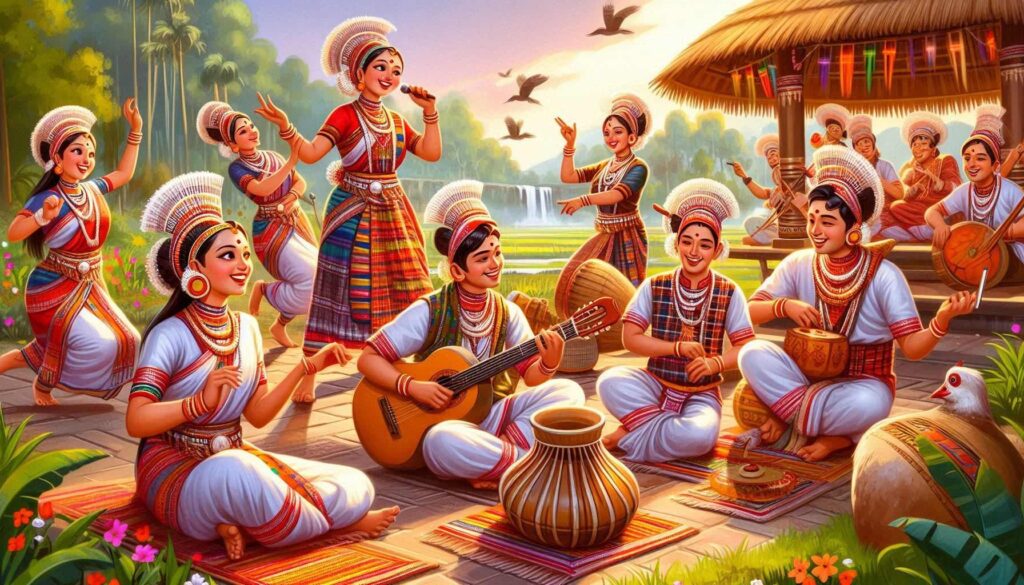Festivals in Assam in August 2025: A Cultural and Spiritual Journey
Assam, with its scenic beauty and rich cultural heritage, transforms into a spiritual and cultural hub during its festivals. August in Assam is a month where traditional, religious, and nature-centric festivals are celebrated with immense fervor. From rituals at the Kamakhya Temple to traditional Assamese folk dances, the diversity of festivals in Assam reflects the state’s unique fusion of tribal customs, Hindu traditions, and natural reverence.
Read More About Hindu Philosophy
In August 2025, Assam will celebrate several key festivals that are deeply ingrained in the state’s cultural and spiritual ethos. Let’s explore these major festivals, their significance, rituals, and what makes them special.
1. Deodhani Festival

Date: August 2-4, 2025
The Deodhani Festival is an important spiritual celebration in Assam, held annually at the Kamakhya Temple in Guwahati. This three-day festival is known for its unique rituals where female oracles (Deodhani) are believed to be possessed by deities and perform ecstatic dances in a trance-like state. It marks the celebration of the goddess Kamakhya, who is associated with fertility and feminine power.
Significance and Rituals
Deodhani is linked to the worship of the Shakti goddess, particularly Kamakhya, who represents fertility, power, and feminine energy. During the festival, oracles enter a trance, believed to be possessed by the goddess, and perform sacred dances in front of large crowds of devotees. Rituals include offerings of flowers, milk, and animals, as well as communal prayers and blessings.
Key Highlights:
- Trance dances performed by female oracles.
- Devotees gather at Kamakhya Temple for blessings.
- Ritualistic offerings to the goddess Kamakhya.
2. Janmashtami

Date: August 15-16, 2025
Janmashtami, the celebration of Lord Krishna’s birth, is one of the most important Hindu festivals in Assam. In 2025, it will be celebrated with grandeur across the state, especially in Vaishnavite temples such as Hajo’s Hayagriva Madhava Temple. The festival signifies the birth of Krishna, the eighth avatar of Vishnu, and is observed with prayers, fasting, and devotional songs.
Significance and Rituals
The festival is marked by fasting and prayers, which culminate in a midnight celebration—the time Lord Krishna is believed to have been born. Temples across Assam are beautifully decorated, and events such as Ras Lila performances (re-enactments of Krishna’s life) and devotional singing (bhajans) are common. Devotees offer sweets, fruits, and flowers at temples, while children often dress as Krishna and Radha.
Key Highlights:
- Midnight prayers celebrating Krishna’s birth.
- Ras Lila performances and bhajan singing.
- Temples decorated with lights and flowers.
3. Manasa Puja

Date: August 18-19, 2025
Manasa Puja is dedicated to the worship of Goddess Manasa, the serpent deity revered in Assam for protection from snakebites, fertility, and overall well-being. The festival is especially important for rural communities, as it aligns with the agricultural season and the need for protection from venomous snakes during the monsoon.
Significance and Rituals
The rituals for Manasa Puja include offerings of milk, flowers, and rice to the goddess, seeking her blessings for protection from snakes and prosperity in agricultural endeavors. Devotees also worship snake images made of clay and wood, with prayers focusing on family well-being, fertility, and protection from natural dangers.
Key Highlights:
- Offerings to Goddess Manasa for protection from snakes.
- Devotional storytelling and folk performances.
- Worship of snake images made from clay and wood.
4. Bihu Cultural Performances

Date: Ongoing in August 2025
While Bihu, Assam’s most famous festival, is mainly celebrated in April, the cultural performances associated with Bihu continue throughout the year, especially during the monsoon season. August often sees village gatherings and performances of Bihu dance and songs, celebrating the joys of nature, agriculture, and community.
Significance and Rituals
Bihu is a celebration of Assamese culture and identity, and even in August, Bihu dance performances can be found in villages and cultural programs. These performances are accompanied by traditional songs, drums, and instruments, symbolizing joy, fertility, and the importance of the monsoon in agrarian life.
Key Highlights:
- Traditional Bihu dances celebrating the monsoon.
- Folk songs honoring nature and fertility.
- Village gatherings for cultural preservation.
5. Teej Festival

Date: August 19-20, 2025
Though traditionally associated with North India, the Teej Festival has gained popularity in Assam, especially among married women. The festival is dedicated to Goddess Parvati and celebrates marital happiness, devotion, and love. Women fast and pray for their husbands’ long lives and the prosperity of their families.
Significance and Rituals
Teej is marked by married women fasting and performing prayers to honor the union between Lord Shiva and Parvati. Women wear colorful sarees, participate in folk dances, and offer flowers, fruits, and sweets to the deities. Teej celebrates the strength of marital bonds, and the festival is an expression of devotion and community among women in Assam.
Key Highlights:
- Fasting by married women for marital bliss.
- Group prayers and traditional folk dances.
- Offerings to Goddess Parvati for family prosperity.
6. Behdienkhlam Festival

Date: August 2025 (Exact dates may vary)
While more prominently celebrated in Meghalaya, the Behdienkhlam Festival is also observed by certain tribes in Assam. This festival, associated with the Pnar people, is celebrated to drive away evil spirits and invoke blessings for a good harvest. It involves communal dances, prayers, and the destruction of symbolic wooden structures representing evil forces.
Significance and Rituals
The Behdienkhlam Festival involves community prayers, drumming, and dances aimed at purifying the land and warding off disease and misfortune. Large wooden structures known as ‘rots’ are ceremonially destroyed, symbolizing the community’s victory over evil. The festival also includes processions, where villagers carry symbolic offerings to the river.
Key Highlights:
- Ritual dances and drumming to drive away evil spirits.
- Destruction of wooden structures representing evil.
- Processions to the river for purification rituals.


